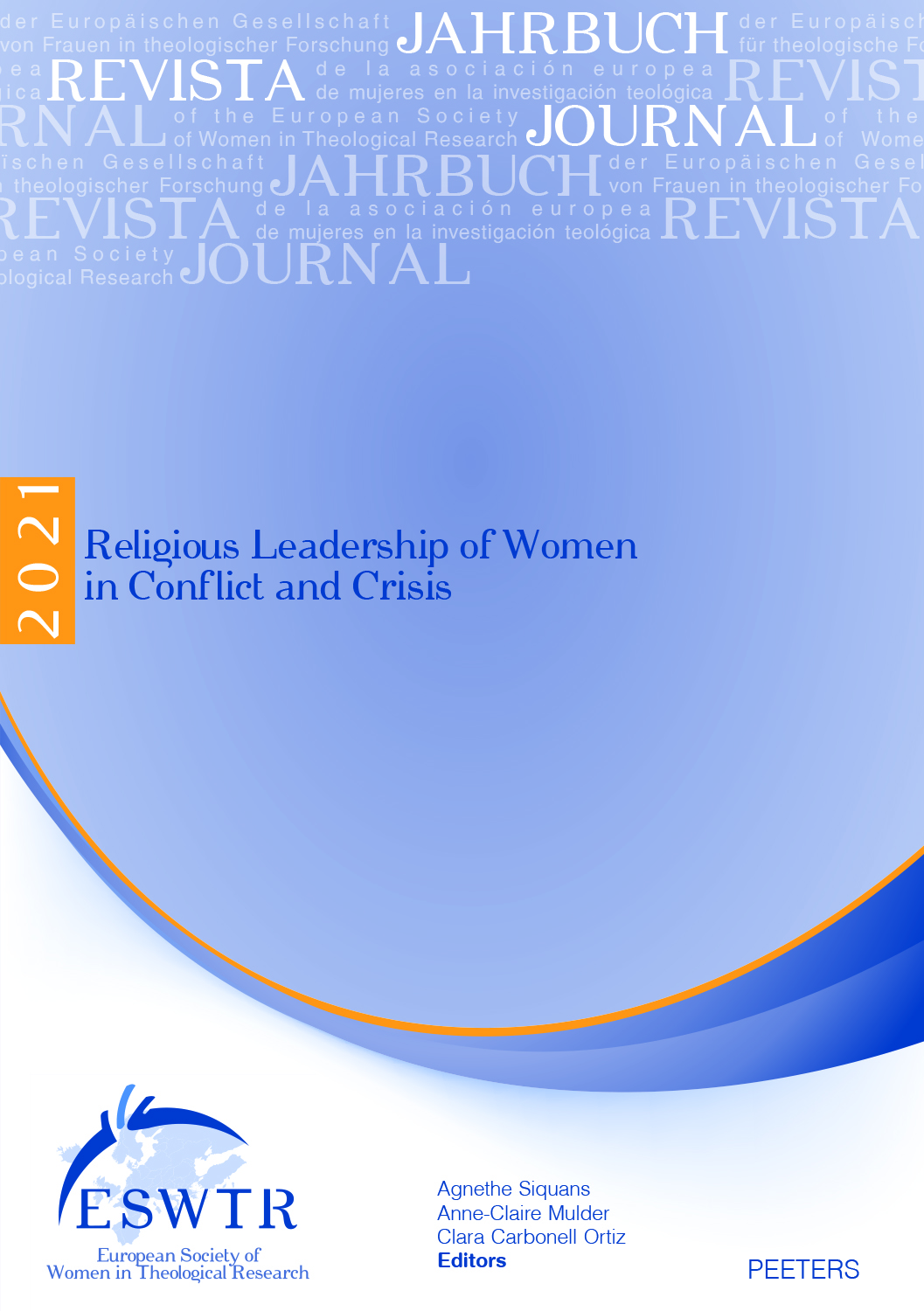 previous article in this issue previous article in this issue | next article in this issue  |

Preview first page |
Document Details : Title: 'I will make thee heir of all my substance' (ActThecl 39) Subtitle: Female Solidarity in the Acts of Thecla Author(s): KÖHL, Katrin Journal: Journal of the European Society of Women in Theological Research Volume: 32 Date: 2024 Pages: 129-147 DOI: 10.2143/ESWTR.32.0.3293703 Abstract : Thecla of Iconium is one of the most important female figures of early Christendom. To this day, she is revered by the Orthodox Church as a protomartyr and an equalto-apostles. The Acta Theclae record the first written account of her to great historical effect. This article will focus on the types of female solidarity found in the Thecla accounts. It will highlight three events in the narrative in particular: the solidarity and obedience that Thecla’s mother, Theocleia, demands of her daughter, the Antiochian women’s collective show of solidarity towards Thecla, and finally the complex relationship of solidarity between Thecla and her wealthy benefactress Tryphaena. The women, especially the two mother figures, each fulfil a different function: Theocleia acts in a classical Roman social context and embodies the fears and concerns in the face of the Christian religion. Tryphaena symbolises the link between Roman social conventions and Christianity as well as the possibility of a Christian way of life specifically for women. The women of Antioch represent the bridge between these two worlds. Solidarity, an important resource in Roman society, was reinterpreted in the context of Christianity; the way in which this was negotiated reflects the situation in the second century, when the young religion and nascent church oscillated between being persecuted by and integrated into the Roman Empire. The story of the apostle Thecla was used to explore these themes in a female context and was, therefore, of particular relevance to women, especially the wealthy women of the Roman nobility, who were an important group for the young church. Thekla von Ikonion gehört zu den wichtigsten weiblichen Figuren des frühen Christentums. In der Ostkirche wird sie bis heute als Protomärtyrerin und Apostelgleiche verehrt. Ihre in den Acta Theclae erstmals schriftlich festgehaltene Geschichte entfaltete eine enorme Wirkung. Im Fokus dieses Artikels stehen Formen weiblicher Solidarität in den Theklaakten. Drei Erzählsituationen werden dabei näher in den Blick genommen: Die Forderung nach Solidarität und Gehorsam, die Theklas Mutter Theokleia an ihre Tochter richtet, die kollektive Solidaritätsbezeugung der antiochischen Frauen gegenüber Thekla und schließlich die komplexe Solidaritätsbeziehung zwischen Thekla und ihrer reichen Unterstützerin Tryphäna. Die Frauen, vor allem die beiden Mutterfiguren, haben jeweils unterschiedliche Funktionen: Theokleia agiert im klassisch-römischen Sozialkontext und verkörpert Ängste und Bedenken angesichts der christlichen Religion. Tryphäna symbolisiert die Verbindung römischer gesellschaftlicher Formen mit dem Christentum sowie die Möglichkeit einer christlichen Lebensgestaltung speziell für ein weibliches Publikum. Die Frauen Antiochias bilden die Brücke zwischen beiden Welten. Insgesamt spiegelt der Umgang mit der für die römische Gesellschaft zentralen sozialen Ressource Solidarität und ihre Neuinterpretation im Kontext des Christentums die Situation des zweiten Jahrhunderts, in dem die junge Religion sowie die entstehende Kirche sich im Imperium Romanum zwischen Verfolgung und Integration bewegten. Anhand der Geschichte der Apostolin Thekla wird diese Thematik in einem weiblichen Kontext behandelt und richtet sich damit besonders an die für die junge Kirche wichtige Gruppe reicher Frauen der römischen Oberschicht. Tecla de Iconio es una de las figuras femeninas más importantes del cristianismo temprano. La Iglesia Ortodoxa la sigue venerando como protomártir e igual a los apóstoles. Los Hechos de Pablo y Tecla constituyen la primera narración sobre Tecla, y tuvieron un gran impacto histórico. Este artículo se centrará en los tipos de solidaridad entre mujeres que se encuentran en las narraciones sobre Tecla. Destacará en particular tres eventos presentes en el relato: la solidaridad y obediencia que la madre de Tecla, Teoclía, exige de su hija; la muestra colectiva de solidaridad de las mujeres de Antioquía hacia Tecla; y, finalmente, la compleja relación de solidaridad entre Tecla y su rica benefactora Trifena. Las mujeres, especialmente las dos figuras maternas, cumplen funciones diferentes: Teoclía actúa en un contexto social romano clásico y encarna los miedos y preocupaciones ante la religión cristiana. Trifena simboliza el vínculo entre las convenciones sociales romanas y el cristianismo, así como la posibilidad de una forma de vida cristiana específica para las mujeres. Las mujeres de Antioquía representan el puente entre estos dos mundos. La solidaridad, un recurso importante en la sociedad romana, se reinterpreta en el contexto del cristianismo. La forma en que esta reinterpretación se negoció refleja la situación del siglo II, durante el cual la nueva religión y la iglesia naciente oscilaron entre la persecución y la integración en el Imperio Romano. La historia de la apóstol Tecla permitió explorar estos temas en un contexto femenino y fue, por lo tanto, de particular importancia para las mujeres, especialmente las mujeres ricas procedentes de la nobleza romana, un grupo significativo para la iglesia naciente. |
 |


